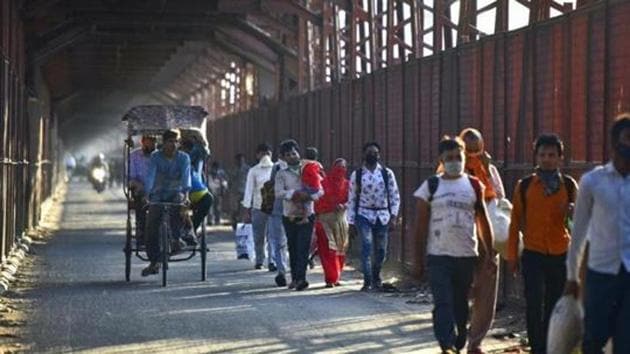How the Supreme Court let down poor workers during the pandemic, writes Gautam Bhatia
By effectively insulating employers from paying wages to workers, it has reinforced an unequal power dynamic
The coronavirus pandemic — and the measures taken by the central and state governments to contain it over the last five months — has led to widespread disruption across the country. A substantial part of this disruption is asymmetric in nature; that is, it has disproportionately affected vulnerable and marginalised people, those unable to work from home, and so on. As we have seen, migrant workers have been particularly affected: The closure of shops, establishments, and industries, in accordance with the lockdown, led to large-scale migration, as workers were left with no source of daily wages to sustain themselves in the cities where they worked.

Accordingly, on March 29, the National Executive Committee, acting under the Disaster Management Act (DMA), issued an order requiring all employers to pay wages to their workers, on the due date and without any deduction, for the period that they had been under closure. The measure was an important one, as it sought to provide a source of basic financial support to workers, at a time at which they had been deprived of their source of livelihood. The order was subsequently withdrawn in May, and so — effectively — what it required was the payment of wages for a period of 54 days, by employers to their workers.
This order, however, was challenged before the Supreme Court (SC). It was argued, among other things, that DMA did not give to the government the power to mandate payment of wages, and, that, in any event, it impinged upon the rights of the employers. The apex court was, therefore, asked to adjudicate upon whether the government had acted legally, and whether its direction for the payment of wages was valid.
Unfortunately, however, SC passed a series of orders that effectively decided in favour of the employers, and against the workers, but without explicitly doing so. First, it, for all practical purposes, stayed the direction by ordering that no coercive action could be taken against employers for failing to comply with the government’s directions. It then took more than a month — and multiple hearings — to hear the case, even as the pandemic and lockdown were in progress, and the issue — involving the payment of wages to people who are compelled to live paycheck to paycheck — was an urgent one.
And finally, in an order on June 12, it adjourned the case to the “end of July”, and directed the employers and workers to “negotiate” with each other, even as it extended its order insulating employers from any coercive action for non-compliance with the government’s directions. Needless to say, the case has not been heard after that.
The apex court’s orders are unfortunate, as they effectively left workers in the lurch. On the one hand, SC has not yet found the payment of wages direction to be illegal or unconstitutional. Consequently, it remains in force, and is presumptively valid. On the other hand, however, SC had prevented its enforcement, thus rendering it toothless, and a mere scrap of paper on the statute book.
The consequence of this has been that the class of people directly affected by the order are precisely those for whom non-payment of wages is — quite literally — an existential issue: The large-scale migration (and the suffering that this has unleashed), predominantly caused by the closure of industry and the absence of livelihood options for workers who already exist in an extremely precarious economic situation, bears clear testimony to that.
Crucially, the court’s order to the employers and employees to “negotiate” is a particularly unkind one: The very reason for the payment of wages direction, in the first place, was the correct assessment that in India, employers and workers exist in a highly unequal relationship.
An “open negotiation” between the (relatively) powerful and the powerless is no negotiation at all. Thus, staying the payment of wages and ordering a negotiation is not any kind of balance. It has completely skewed the field in favour of the employers, without any judicial finding that the payment of wages direction itself was illegal.
As the end of August approaches, one hopes that the case will be taken up expeditiously by the Court, and resolved in clear terms.






